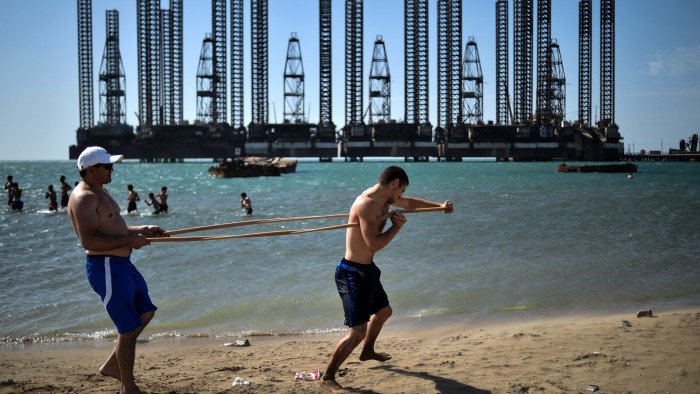Stay informed with free updates
Simply sign up to the Climate change myFT Digest — delivered directly to your inbox.
The Caspian Sea is within weeks of reaching its lowest level on record, an Azerbaijani official said, as climate change causes lasting damage to the world’s largest inland body of water.
The host country of the COP29 climate summit in Baku, at its main stadium just minutes away from the Caspian Sea, has witnessed the record retreat of the salt water for the past nearly 30 years of its long geological history.
The ebbing of the water levels has been most “obvious” since 1995, said Faig Mutallimov, head of the environmental policy division at Azerbaijan’s ecology ministry. “One of the main causes is climate change.”
By the end of this year, Mutallimov said water levels were expected to “reach or even pass” the previous low set in the late 1970s when it dropped to 29m below sea level after tributaries were dammed.
Other inland bodies of water have also come under immense stress in recent years, including the Aral Sea, which largely disappeared over a 50-year period.
The complete disappearance of the Caspian Sea was unlikely because of the depths of the middle and southern basins, said Rohit Samant, co-author of a study forecasting its future decline.
But many port cities and towns could be put under intense strain and other areas, including around the shallower northern basin, could dry up.
Samant’s study, published last year in Nature’s Communications Earth & Environment journal, had forecast sea level falls of between 8m and 14m by the end of this century.
As global temperatures increased because of climate change, there was more evaporation from the sea, while precipitation and wind patterns had changed, all affecting water levels, he said.
The mean level of the Caspian Sea fell by about 30cm in 2023 compared with the year before, reaching a low of 28.99m below sea level. This was attributed to low run-off from the vast Volga river system, which runs some 3,500km through central and southern Russia, according to the Caspian Sea co-ordinating committee on hydrometeorology.
In August, Azerbaijan’s president Ilham Aliyev raised what he called the “catastrophic” shrinking of the Caspian with Russian President Vladimir Putin, as concerns grow about the economic and environmental impact of the retreat.
Mutallimov said a regional working group of government officials, scientists and other experts was set up earlier this year to better understand the falling levels of the water body bordered by five countries — Russia, Azerbaijan, Kazakhstan, Turkmenistan and Iran — which was affecting coastal infrastructure such as ports and oil platforms.
More than 90 per cent of Azerbaijan’s total export earnings are derived from oil and gas, the biggest contributor to climate change when burnt.
As the waters become shallower, Mutallimov said, it affected the “carriage capacity” of vessels, forcing them to carry fewer goods. Oil rigs and platforms had also become harder to reach and operate.
The decreasing water level was also a “cause for concern” for those working in energy infrastructure, said Rick Fawn, senior lecturer in international relations at the University of St Andrews. “There is no agreement on the range of possible shrinkage. That is a concern because some of the infrastructure development could be affected.”
Speaking at COP29, Inger Andersen, executive director of the UN Environmental Programme warned the Caspian was “under siege from the triple planetary crisis: the crisis of climate change, the crisis of nature, land and biodiversity loss, and the crisis of pollution and waste”.
It was also a human crisis, she said. “Such a decline would devastate ecosystems and species, threaten livelihoods and harm food security and stability across the region.”
The Caspian Sea is famous for wild sturgeon, prized for its caviar, and is home to an estimated 90 per cent of the planet’s last-remaining sources, as well as endemic Caspian seals.
Some attendees at an exclusive dinner for ministers, financiers and others during COP29 were shocked by the visible retreat of the sea around Baku, according to those present. The dinner took place at a house historically located on the seashore, which now overlooks mud flats, they said.
Read the full article here

